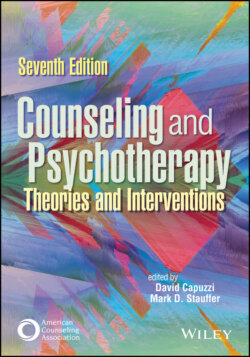Читать книгу Counseling and Psychotherapy - Группа авторов - Страница 80
RCT in Contemporary Practice
ОглавлениеRCT has grown as a substantive theory for counselors, counseling researchers, and professional counseling organizations. The Association for Creativity in Counseling, one of the 18 chartered divisions of the American Counseling Association (ACA), was intentionally founded on the principles of RCT integrated with creative practice (Duffey & Kerl-McClain, 2008). Likewise, numerous researchers have published about RCT in counseling for numerous client concerns, including couples counseling, addiction, supervision, counselor education, crisis and trauma, career counseling, and mentoring (Alvarez & Lazzari, 2016; Banks, 2006; E. Brown et al., 2020; Dorn‐Medeiros et al., 2020; Duffey & Haberstroh, 2020; B. Hall et al., 2018; K. Hall et al., 2018; Hitter et al., 2017; Purgason et al., 2016; Singh et al., 2020; Singh & Moss, 2016; Stargell et al., 2020; Storlie et al., 2017; Vandermause et al., 2018). It is clear that RCT is a viable approach to working with a variety of clients and client concerns. In 2018, Judith Jordan published the second edition of Relational Cultural Therapy, which applies RCT principles in contemporary counseling practice. Rich with examples and conceptualizations, the book provides counselors with a way to work with clients grounded in RCT philosophy and practice. Finally, RCT began as a feministic critique of counseling practices that has now emerged into a counseling theory that helps counselors understand the fundamental human experience of growth and development. Although RCT is a robust approach to working with men and other people from privileged positions (Duffey & Haberstroh, 2014; Lenz, 2016), the core developmental considerations of RCT begin with deconstructing the dominant masculine conceptions of human nature and human development (Miller, 1976, 1986).
